Capsule Filling Machine
-
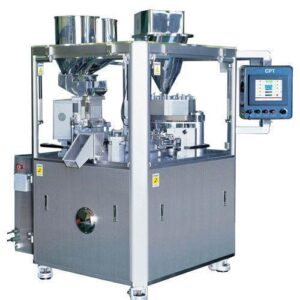
Automatic CapsAule Filling Machine
View Machines -
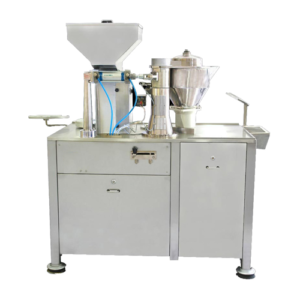
Semi Automatic Capsule Filling Machine
View Machines -
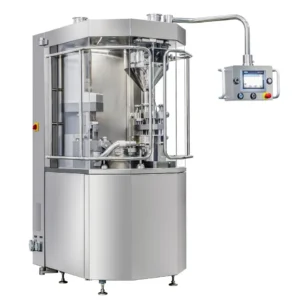
Fully Automatic Capsule Filling Machine
View Machines -
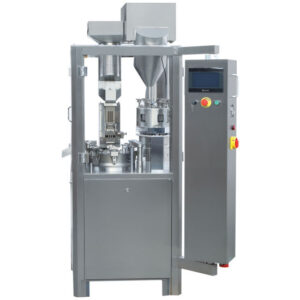
NJP-400 Full Automatic Capsule Filling Machine
View Machines -
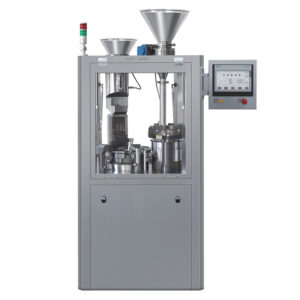
NJP-800 Full Automatic Capsule Filling Machine
View Machines -
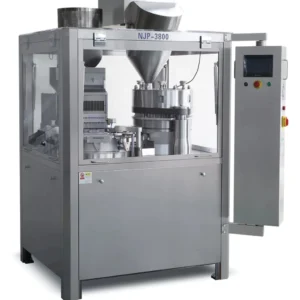
NJP-1200 Automatic Capsule Filling Machine
View Machines -
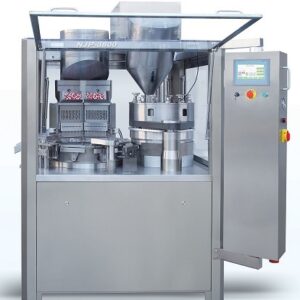
NJP-2000 Automatic Capsule Filling Machine
View Machines -
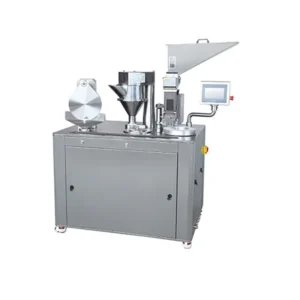
CGN208-D Semi-automatic Capsule Filling Machine
View Machines -
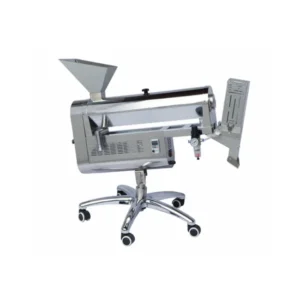
JFP-110A Capsule Polishing and Sorting Machine
View Machines
Introduction of Capsule Filling Machines
In the production process of pharmaceutical and nutraceutical industries, capsule-filling machines are important. These machines encapsulate various substances in gelatin or vegetarian capsules automatically, ensuring that accuracy, efficiency and safety are maintained in the manufacturing process. This is a comprehensive guide on capsule filling machines which will cover their types, working process, applications, functions, benefits, future trends, maintenance and training.
Understanding Capsule filling Machine
Types of Capsule Filling Machines
Different types of capsule-filling machines are designed to meet distinct production needs and volumes. They include:
Manual Capsule Filling Machines: They are operated manually needing human intervention in all steps of the fielding process. They may be suitable for small-scale productions or laboratory use but they are not as efficient as automatic ones.
Semi-Automatic Capsule Filling Machines: Some aspects of the filling process like capsule loading and filling are automated by semi-automatic machines. However, manual intervention is still required for other tasks such as sealing and ejection of capsules.
Automatic Capsule Filling Machines: These are fully automated with minimal human intervention and capable of handling high volumes of capsules since precise filling, ejection and sealing processes enhance productivity.
Working Process of Capsule Filling Machine
In general terms; however, irrespective of the mode employed by different manufacturers to design them; these kinds of machines have a similar working procedure as follows;
Capsule Loading: Empty capsules are put into the machine’s hopper/magazine where they get sorted out and oriented correctly for fillings.
Filling: The active ingredient or powder formulation is dispensed into empty capsules at the filling station whereby accurate dosing is crucial in maintaining consistency and accuracy between each capsule.
Tamping (Optional): Other versions have a tamping mechanism to compact drug powders inside the caps ensuring uniformity so that air spaces do not remain.
Capsule Sealing: After being filled, capsules are sealed by either mechanical or adhesive method depending on the design of the machine.
Ejection: Finally, the filled and sealed capsules pop out of the machine ready for further processing or packaging.
Applications of Capsule Filling Machines
They include;
Pharmaceutical Industry: Active pharmaceutical ingredients (APIs) are extensively encapsulated using capsule-filling machines to allow for precise dosage and easy medication administration.
Nutraceutical Industry: The nutraceutical industry encapsulates dietary supplements such as vitamins, herbal extracts and other nutritional formulations using capsule-filling machines
Cosmetics Industry: Some capsule filling machines have been adapted for use in cosmetics where they aid in encapsulating skincare ingredients such as serums and creams into capsules meant for convenient application.
Veterinary Medicine: Capsule-filling machines also produce oral medications and supplements targeting animals with their unique dosage needs.
Research and Development: In research labs, capsule-filling machines assist scientists in enclosing experimental formulations that are included in preclinical and clinical trials thereby making the drug development process easier.
Functions of Capsule Filling Machines
To ensure efficient and accurate encapsulation, capsule-filling machines perform several essential functions. These include:
Precision Dosing: Accurately dispense the desired amount of active ingredient or powder formulation into each capsule to ensure uniformity in dosages.
High Throughput: Minimize production time and increase productivity by efficiently handling large volumes of capsules.
Versatility: They can accommodate different sizes of caps as well as formulations thereby providing some level of flexibility during production.
Quality Assurance: Ensure that capsules filled meet safety, efficacy and purity regulatory standards.
Automation: Automate some filling stages to minimize human errors and increase operational efficiency.
Benefits of Capsule Filling Machines
Capsule filling machines have many profits for the manufacturer such as:
Increased Efficiency: This reduces manual labour in encapsulation process automation hastening production resulting in higher throughput and lower production costs.
Precise Dosage Control: This protects against inaccurate dosing of active ingredients thereby minimizing dosage errors, and ensuring consistent product quality.
Flexibility: Allows use with different capsule sizes as well as formulations hence manufacturers can meet diverse market demands.
Improved Product Quality: It checks quality control parameters that result in high-calibre capsules made in compliance with regulatory requirements and clients’ desires.
Cost Savings: Cutting down on labour charges, waste in material usage and optimizing production processes leads the way to cost savings in total for manufacturers who use these capsule fillers.
Future Trends in Capsule Filling Technology
Several future trends are impacting the way capsule-filling machines will work as technology continues to evolve including:
Integration of Artificial Intelligence (AI): AI-based systems integrated into capsule-filling machines optimize process parameters, enhance efficiencies, and improve quality control mechanisms.
Industry 4.0 Integration: Installation of sensors, connectivity and data analytics capabilities on the machine enables real-time monitoring, predictive maintenance and remote operation based on Industry 4.0 principles among others like this.
Advanced Material Handling: Advancements in handling mechanisms such as robotics, and automated guided vehicles (AGVs) are improving the efficiency and flexibility of various types of modern capsule fillers you can find around today.v
Sustainability Initiatives: Manufacturers are focusing more on producing environmentally friendly solutions for capsule filling by applying recyclable materials, minimizing energy consumption and waste generation
Personalized Medicine: In line with the personalization of medical treatment, future capsule-filling machines may be modified to dispense custom-made doses and formulae based on the unique patient.
Maintenance of Capsule Filling Machines
To ensure the proper performance and durability of capsule-filling machines, they should be properly maintained. Some key maintenance activities include:
Regular Cleaning: After each production cycle, clean the machine thoroughly so that it does not leave any residues or contaminants that can affect product quality.
Lubrication: Ensure to apply enough lubricant in the moving parts hence preventing friction and wear for smooth operation.
Calibration: Regulate your machine frequently to ensure accurate dosing and filling processes, and reduce varied weights and content in capsules.
Inspection: Periodically maintain your machine against wear, damages or outages then address them in good time before causing accidents or halting the production process thus compromising safety.
Training: Instruct operators on how to run this equipment as well as other topics such as cleaning it up after use or repairs of any sort.
Training for Capsule Filling Machine Operators
Capsule-filling machines must only be operated by trained personnel who know how to use them safely and efficiently this training is expected to cover the following areas:
Machine Operation: The person should understand a capsule-filling machine’s components, controls, and operating procedures well enough.
Safety Procedures: Teach about the importance of sticking by safety protocols while using machines thus averting any possible accidents when one is operating a machine.
Quality Control: Operators should learn how to check if products are satisfactory; and detect defects or deviations at an early stage before taking necessary action so as not to compromise product quality.
Maintenance Procedures: Teach the crew how to conduct maintenance activities including cleaning, greasing and calibrating to keep it up well.
Frequently Asked Questions
- What is a capsule-filling machine?
Capsule-filling machines are mechanical tools that are used for packing powders, granules or liquids into empty gelatin or vegetarian capsules thus making pharmaceuticals, and dietary supplements among others.
- How does a capsule-filling machine work?
In particular, capsule-filling machines follow a sequence of actions; loading the empty capsules before they get filled with the content in question then followed by sealing and finally ejecting these filled ones. It involves dosing, sealing and ejection mechanisms hence its effectiveness.
- What are the different types of capsule-filling machines?
They can be categorized into manual, semi-automatic and automatic types. The first one requires human interventions at every stage but the second one does this automatically whereas the last one performs all processes for mass production.
- What are the main applications of capsule-filling machines?
It is therefore essential to know that they find their use within the pharmaceutical industry as well as nutraceuticals cosmetics veterinary medicine etc. where active ingredients are encapsulated alongside dietary supplements vitamins herbal extracts among other formulations.
- What are the benefits of using capsule-filling machines?
High productivity efficiency becomes an additional advantage of using them due to precise dosage administration flexibilities during manufacturing process improvement of high-quality products produced through automated and optimized productions thus saving costs.
- What are future trends in capsule-filling technology?
Other advancements include the integration of AI (Artificial Intelligence), which may lead to Industry 4.0’s advanced material handling systems sustainability personalization of medicinal solutions such as drugs taken by mouth for increasing efficiency so that mealtimes are more efficient and sustainable keeping an eye on quality improvements.
- How should capsule-filling machines be maintained?
To maintain their good working condition over time regular cleaning, lubrication calibration tests inspections must be performed. As a result, the breakdown would be avoided product standards would be preserved and workers’ protection ensured.
- What training is required for operating capsule-filling machines?
The operators need to know how the machine works, safety precaution measures, quality control practices, maintenance activities carried out on it and problem-solving procedures used during its operations.
- What are the key considerations when selecting a capsule-filling machine?
Some of these factors are; production capacity, suitability of capsules in terms of their sizes, accuracy in dosing, automation scope i.e. how easily it’s maintained plus lastly regulatory compliance and cost-effectiveness so that an option is arrived at.
- Are capsule-filling machines customizable to specific production needs?
Indeed, they can be adjusted to meet certain manufacturing demands such as different kinds of capsule sizes fillers dose level rates among others.
